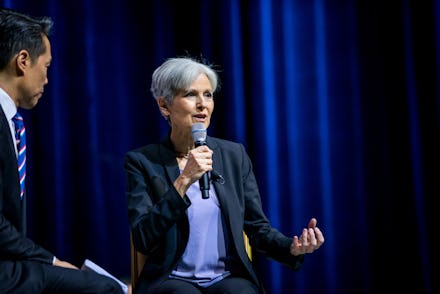Third-party candidates are having a moment — here's what to know this 2016 election season

Millennials are showing increasing support for third party candidates in this year's presidential election. Among voters ages 18 to 34, Libertarian Party candidate Gary Johnson gets 11% of the vote, according to a new USA Today/Rock the Vote poll; Green Party candidate Jill Stein gets 4%.
For unhappy or undecided voters looking for an alternative to Republican Donald Trump and Democrat Hillary Clinton, third-party candidates could actually play a role in the outcome of the election, and millennials just might be the driving force behind that boost.
"As the nation's largest and most diverse generation in history, millennial voters are a juggernaut this cycle," Jesse Moore, Rock the Vote Vice President of Civic Engagement told USA Today. "Young people are passionate about the issues, and we're ready to fight for a future that is as just and inclusive as we are. Any candidate that chooses to ignore the millennial vote does so at their own peril."
Evan McMullin, a 40-year-old former CIA agent from Utah, announced his campaign as an independent earlier in August.
"In a year where Americans have lost faith in the candidates of both major parties, it's time for a generation of new leadership to step up. It's never too late to do the right thing, and America deserves much better than either Donald Trump or Hillary Clinton can offer us," McMullin said.
So who are these candidates, and could one of them actually win the White House?
Third-party candidates tend to get lost in the media crush of coverage of the battle between Republicans and Democrats. Both Stein and Johnson ran for president in 2012. Still, they're largely unknown among voters.
Ralph Nader, perhaps the most widely known third-party candidate, got just 2.7% of the vote in 2000, but many blamed him for contributing to Al Gore's loss to George W. Bush. Nader is often cited as a reason not to vote for third-party candidates, since it usually just tips the scale to one major party candidate over another.
The most successful third-party candidate in recent history was Texas businessman Ross Perot, who ran as an independent in 1992.
That was a year when many voters were also unhappy with the major party candidates, George H.W. Bush and Bill Clinton, according to the Pew Research Center. One of the major things that helped boost Perot was his eclectic and energetic appearances on the main stage at the three televised presidential debates.
And Libertarian candidate Gary Johnson could make history again, if he can eek out at least 15% support in the polls before the first Trump-Clinton debate set for Sept. 26.
It's unlikely that a third-party candidate will get enough support to actually beat Trump or Clinton. Still, the total votes for all third-party candidates could affect the overall outcome, especially among a disaffected electorate.
"One thing to watch out for is the cumulative share of the vote earned by third-party candidates. It could be that Johnson takes 4 percent, Jill Stein gets 1 percent, the Constitution Party gets 0.3 percent, etc. That is, the third-party candidates get more support than usual, but it's spread over a few different candidates," wrote Harry Enten, senior political writer and analyst for FiveThirtyEight.
Here's what you need to know about the third-party candidates vying for the Oval Office.
Jill Stein, Green Party
Jill Stein ran for president on the Green Party ticket in 2012. She's banking on Bernie Sanders supporters to flock to her campaign. Her "Power to the People" plan outlines several reforms, including raising the federal minimum wage to $15 an hour, establishing a single-payer public health insurance program, free college, raising taxes on Wall Street and demilitarizing the police.
Born in Chicago, she graduated from Harvard Medical School in 1979. She has run for several political offices in Massachusetts. Her vice presidential pick is Ajamu Baraka, an African-American human rights activist.
Gary Johnson, Libertarian Party
Gary Johnson served as the Republican governor of New Mexico from 1995 to 2003. He also ran for president on the Libertarian ticket in 2012. With former Massachusetts governor Bill Weld as vice presidential running mate, Johnson wants to cut spending, overhaul the federal tax code, and curb government surveillance.
"Gary Johnson and Bill Weld want to get the government out of your life. Out of your cell phone. Out of your bedroom. And back into the business of protecting your freedoms, not restricting them," according to their official campaign website.
Recent polls put support for Johnson/Weld at about 9%. If they can reach 15% ahead of the first presidential debate on Sept. 26, Johnson can join Donald Trump and Hillary Clinton on the main stage, which could be a game changer, or at least shake up the dynamic between the two frontrunners.
Evan McMullin, Independent
Evan McMullin is a 40-year-old Mormon from Utah who has never held political office. A former CIA agent, McMullin also worked for the House Committee on Foreign Affairs and was chief policy director of the House Republican Conference. While McMullin just entered the race last week, getting on the ballot in Utah, he says he will be able to get on other state ballots even though most of the filing deadlines have passed.
"A lot of people misunderstand the process. There are a multitude of ways to get on ballots in the United States. We're pursuing all of them," McMullin told CNN last week, according to Politico.
McMullin's campaign website doesn't lay out too many details, but he says he would advocate for a strong military, job creation and repealing Obamacare.
How well do you know our third party candidates? Take The Unconvention quiz to test your savvy!